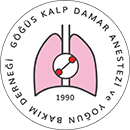

Comparison of Bretschneiders Histidinetryptophanketoglutarate Cardioplegia Solution and Conventional Blood Cardioplegia Solution in Terms of Postoperative Acute Kidney Injury and Outcome Parameters
Elif Gözde Doktaş1, Senem Girgin2, Murat Aksun2, Birzat Emre Gölboyu2, Ahmet Salih Tüzen2, Nagihan Karahan2, Ali Gürbüz31Department of Anesthesiology and Reanimation, Mehmet Akif Ersoy Thoracic and Cardiovascular Surgery Training and Research Hospital, İstanbul, Türkiye2Department of Anesthesiology and Reanimation, İzmir Katip Çelebi University Ataturk Training and Research Hospital, İzmir, Türkiye
3Department of Cardiovascular Surgery, İzmir Katip Çelebi University Ataturk Training and Research Hospital, İzmir, Türkiye
Objectives: This study aimed to compare Bretschneiders histidinetryptophanketoglutarate (BHTK) and blood cardioplegia in terms of postop-erative acute kidney injury (AKI) and outcome parameters in patients who underwent open-heart valve surgery.
Methods: A total of 94 patients who underwent open-heart valve surgery between January 2016 and November 2021 were retrospectively evaluated. According to the administration of BHTK and blood cardioplegia, patients were stratified into two groups. Postoperative Kidney Disease Improving Global Outcomes was compared in terms of development of AKI and outcomes according to staging.
Results: A total of 31 patients in the BHTK group and 63 patients in the blood cardioplegia group were evaluated. No statistical difference was found between the groups in terms of postoperative AKI (p>0.05). Postoperative 24 and 48 h blood urea nitrogen (BUN) was higher in the BHTK group (p=0.007 and p=0.023). This difference equalized on the 7th day. No statistical difference was found in the mechanical ventilation time, intensive care unit and hospital stay, and 30-day mortality.
Conclusion: Literature evaluating the systemic effects of BHTK solution is limited. In our study, although no difference was found between BHTK and blood cardioplegia in terms of AKI development, the increase in BUN in the BHTK group was remarkable. Further studies exploring the clinical impact of this finding are warranted.
Keywords: Acute kidney injury, blood cardioplegia, blood urea nitrogen, bretschneiders histidine-tryptophan-ketoglutarate, myocardial protection
Makale Dili: İngilizce
(469 kere indirildi)

















